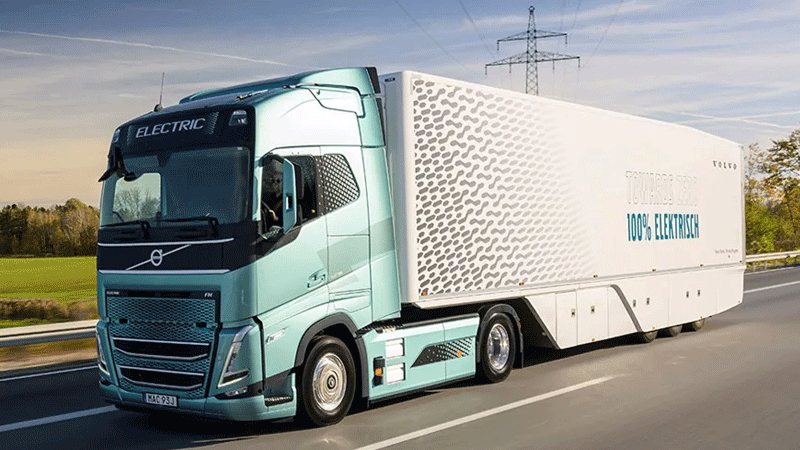Maersk purchases 25 Volvo e-trucks for climate-friendly container transports in Germany

Maersk, a leading innovator in integrated and sustainable logistics solutions, announces a new initiative to reduce GHG emissions in hinterland container transports by purchasing 25 state-of-the-art Volvo FH electric trucks in Germany. This strategic investment highlights the company's commitment to decarbonizing global logistics and to becoming a net-zero company by 2040 across all business areas and all modes of transport.
“Recognizing the pressing need to address the environmental impact of logistics, we are taking a bold step forward by ordering 25 advanced e-trucks. These cutting-edge vehicles, powered by renewable energy sources, hold immense potential in substantially curbing carbon emissions and further reducing Maersk's carbon footprint. We see a rising demand from our customers for cleaner end-to-end transportation solutions with minimal greenhouse gas (GHG) emissions. Equally important, the deployment of e-trucks is expected to alleviate noise emissions in the residential areas surrounding the warehouses where they will be operationalized.”
Jens-Ole Krenzien, Maersk Managing Director North Europe Continent
The first two units are planned to be delivered by Volvo Trucks in Q4 2023, the last in Q1 2024. The purchase of fully electric trucks is supported by the German Federal Ministry for Digital and Transport. Maersk is currently also looking into setting up charging infrastructure with green electricity for the own e-truck fleet at its warehouses in Germany.
Maersk will use the e-trucks for local deliveries in places like its large new warehouse in Duisburg which will be opened this summer and in the area Bremen/Bremerhaven, one of Maersk’s main gateway ports in Germany. A deployment of e-trucks for shunting containers within the warehouse areas is also considered to eliminate even smaller sources of GHG emissions along the transport chain.
By investing in e-trucks, Maersk aims to set a new standard for inland container transports. The transition to electric vehicles aligns perfectly with the company's core values of environmental responsibility and innovation. By utilizing advanced technologies, Maersk is reshaping the landscape of logistics and reinforcing its position as a frontrunner in decarbonizing global logistics.
Besides the step in Germany, Maersk ordered 110 Volvo VNR electric trucks for North America a year ago, increasing its total commitment in the US to 126 Volvo trucks plus 300 e-trucks by its partner Einride. More e-truck initiatives by Maersk are ongoing in other countries, besides low GHG emission rail solutions based on renewable energy as available in Germany, or based on climate-neutral bio-fuels as just announced in Spain.
“The successful deployment of e-trucks in the US and the rising demand of many customers for climate-neutral hinterland logistics made the German order a logical next step in our efforts to further decarbonize hinterland logistics. It’s still early days in e-trucking: higher total cost of ownership, long project deployment times due to lack of infrastructure, and operational inefficiencies are some of the challenges. But these can only be overcome, if all industry players, customers and governments work together. By taking a lead on demand for e-trucks and infrastructure, we want to play our part of unlocking the chicken-and-egg situation and inspire others to follow along.”
Julia Heil. Head of Energy Transition Execution at Maersk in Copenhagen
The advanced features of the Volvo FH electric trucks include state-of-the-art safety, energy management and supportive systems which lead to more energy efficiency and a significantly lower risk of accidents.
The project is funded with more than 4.3m Euros by the Federal Ministry for Digital and Transport in context of the federal funding program “Climate-friendly commercial vehicles and infrastructure (KsNI)”. The funding program is coordinated by NOW GmbH, applications are approved by the Federal Logistics and Mobility Office.








